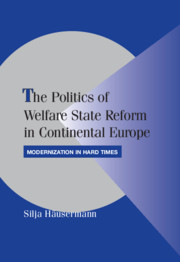Book contents
- Frontmatter
- Contents
- List of Figures
- List of Tables
- Preface
- The Politics of Welfare State Reform in Continental Europe
- 1 “EPPUR SI MUOVE”: WELFARE STATE CHANGE DESPITE INSTITUTIONAL INERTIA
- 2 MODERNIZATION IN HARD TIMES: THE POST-INDUSTRIAL POLITICS OF CONTINENTAL WELFARE STATE REFORM
- Part I Pension Reform in Continental Europe: A Framework of Analysis
- Part II Determinants of Successful Pension Reform in Continental Europe
- Appendices
- References
- Index
- Cambridge Studies in Comparative Politics
1 - “EPPUR SI MUOVE”: WELFARE STATE CHANGE DESPITE INSTITUTIONAL INERTIA
Published online by Cambridge University Press: 06 July 2010
- Frontmatter
- Contents
- List of Figures
- List of Tables
- Preface
- The Politics of Welfare State Reform in Continental Europe
- 1 “EPPUR SI MUOVE”: WELFARE STATE CHANGE DESPITE INSTITUTIONAL INERTIA
- 2 MODERNIZATION IN HARD TIMES: THE POST-INDUSTRIAL POLITICS OF CONTINENTAL WELFARE STATE REFORM
- Part I Pension Reform in Continental Europe: A Framework of Analysis
- Part II Determinants of Successful Pension Reform in Continental Europe
- Appendices
- References
- Index
- Cambridge Studies in Comparative Politics
Summary
Welfare states count among the major achievements of Western industrialized democracies in the twentieth century. Today, however, they face a number of challenges: declining economic growth, unemployment, and demographic aging threaten their financial viability, and the post-industrialization of labor markets and family structures has created new social risks, which are insufficiently covered by the existing social protection schemes. There is a double risk of policy deficiency: welfare states may spend too many scarce resources on old risks while not addressing the most pressing problems of post-industrial society. Given that only effective welfare states can be legitimate, the future of modern welfare states depends not least on their ability to adapt to changing social and economic needs and demands. This book argues that welfare states can be reformed, and it demonstrates the conditions for successful policy change: multidimensional reform politics, coalitional engineering by policy entrepreneurs, and an institutional context that favors negotiation and compromise.
Against both conventional wisdom and recent scholarly research, this book argues that the main question is not just whether welfare states can be preserved or whether they have to be radically dismantled. Rather, the challenge that social policy makers face today is the genuine adaptation of social protection to a profoundly altered economic and social context: modernization in hard times. Modernization refers to the adaptation of existing institutional arrangements to the economic and social structures of post-industrialism: the transition to a (high-skill) service economy, high rates of temporary or long-term unemployment, flexible labor markets, the spread of atypical and female employment, family instability, and mounting demands for individualization and gender equality.
- Type
- Chapter
- Information
- The Politics of Welfare State Reform in Continental EuropeModernization in Hard Times, pp. 1 - 13Publisher: Cambridge University PressPrint publication year: 2010



